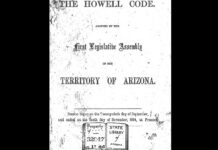
The disconnect between some four members of the Sedona City Council and the city’s workers and businesses is often startling and disappointing.
We’re glad Mayor Scott Jablow, Councilwoman Jessica Williamson and Councilman Pete Furman understood that Sedona’s business community needs to prepare for the looming recession and voted to release already-budgeted marketing contingency funds to the Chamber of Commerce. Unfortunately, this money will remain in the city’s account, unspent.
Four other members of council looked at the numbers, the data and the demands, requests and pleas from Sedona residents and said they would rather trust their intuition and gut instinct than the numbers. That’s how we landed men on the moon — with hunches, not pesky math.

Tax revenue is collected by Sedona businesses, which is why the Sedona City Council can spend the money that it has on the projects that it does.
If it wasn’t for the Jeep tours, OHV rental companies, restaurants, retail shops, hotels, spas and services, the city of Sedona would not have the tax income that it does. Sedona residents can choose to hate whichever of these industries and businesses they want, but the bottom line is that this amalgamation of private companies generates the revenue that makes our city work.
The city’s own numbers demonstrate that tourists make up 78% of Sedona’s tax base. To put it another way, if the Sedona Police Department has about 25 uniformed officers, 20 of those positions were funded by tourist dollars.
Without retailers and businesses serving tourists, Sedona is no different than the bottom of the Grand Canyon — very pretty, but pack in your food and your own toilet paper.
Tourists are not stumbling across Sedona because of a wayward GIS system, parking their cars, looking at the red rocks and then driving home. They come here because a local spa’s Google ad enticed them to get a massage, or they read a restaurant review in one of the hundreds of Phoenix-area glossy magazines, or they saw photos of Sedona on Instagram and Facebook or read a hiking blog that tells not only of trails but also of the restaurants and retail shops that they themselves may seek to find, like a treasure hunt.
The Marriott, Hyatt and Hilton resorts and Sedona’s timeshares cross-advertise their Sedona properties at their other facilities around the world, some of which brings their guests here. But most of Sedona’s businesses are not corporations insulated from economic downturns — they are mom-and-pop operations run by residents who have called Sedona home for years or decades, put their kids through our schools and have friends in the city, fire district and schools, whose kids or relatives they employ. They need and begged for this help.
As such, when these tax revenue-generating establishments tell Sedona’s City Council that they anticipate dramatic losses and need help as the expected 2023 recession looms, it’s inexplicable the council would deny spending $225,000 already set aside for just such an occasion.
Council already spent — doing the math here — 105 times that amount to buy a chunk of land it may do nothing with for at least a half a decade, according to Sedona’s mayor, although five years is overly ambitious for any government program in our city.
At the same meeting at which the council said “no” to helping Sedona’s businesses with $225,000, the council also voted to give $406,016 to Steps to Recovery, a Cottonwood nonprofit, to buy transitional housing — not in Sedona, but anywhere in the Verde Valley. This housing need not even be within Sedona city limits. Ergo, Sedona tax dollars will be spent on buying a home that could be located far outside our city, meaning Sedona may not even collect any taxes on the repairs or improvements done to that house.
That said, Steps to Recovery is an absolutely vital community program we have vigorously supported for years and they deserve every dime they ask for to help recovering addicts.
However, if Steps to Recovery successfully helps a dozen more former addicts get clean and sober, where are they going to find good-paying jobs if the city declines to help their potential employers and those businesses go out of business?
Destination marketing lifts all boats. It may put more butts in beds in hotel rooms, but those wide-eyed tourists also shop for trinkets in Uptown, go hunting for pad Thai or burgers or get facial massages in the city while they’re here, and our restaurateurs, waiters, hotel room cleaners, retail store clerks, tour guides and even our shamans, gurus and healers benefit.
Relying on daytrippers won’t get us through the recession. “Voluntourists” don’t build trails. If they do anything, it’s on a whim as one part of a multi-day excursion. The city’s management goals mean nothing if tourists roll up to Sedona at random and pack onto the same overused trails every weekend.
We commend Jablow, Williamson and Furman for hearing the cries for aid from Sedona’s workers and trying to help. We wish other council members would follow the data and hear their pleas as well.
History and the bankruptcy courts alike are littered with the remains of those who trusted their gut and ignored numbers.
Christopher Fox Graham
Managing Editor



















